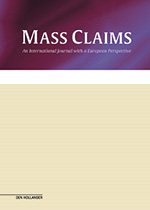Bundling of Claims by way of Assignment in Germany
Carsten Krüger and Andreas Weitbrecht11. Dealing with Multiple Claims in Germany
1.1. Multiple Parties
In line with other legal systems, civil procedure in Germany starts from the model of one plaintiff litigating a particular claim against one defendant. However, at least since the enactment of the Code of Civil Procedure (Zivilprozessordnung) in the late 19th century, there have been special provisions to deal with multiple plaintiffs against one or more defendants, provided that the claims bundled in one action and therefore in one proceeding are of the same kind and based on largely identical facts or legal provisions.2 Thus, for example, five companies allegedly injured by a hardcore cartel among five suppliers can collectively sue these five suppliers in one proceeding. However, even though these claims are being dealt with together, each claim against each defendant can be subject to different outcomes.
This modus operandi
U heeft op dit moment geen toegang tot de volledige inhoud van dit product. U kunt alleen de inleiding en hoofdstukindeling lezen. Wanneer u volledige toegang wenst tot alle informatie kunt u zich abonneren of inloggen als abonnee.
Verder in dit artikel:
1. Dealing with Multiple Claims in Germany
1.1. Multiple Parties
1.2. Existing procedural Instruments for Collective Redress
1.2.1. Skepticism on the Part of the Legislator
1.2.2. Capital Markets Model Case Act
1.2.3. Model Declaratory Action Act
1.3. Directive (EU) 2020/1828
2. The (Claims) Assignment Model
2.1. Elements
2.2. Consumer Protection
2.3. The Particular Case of Competition Law
2.4. Case Law on Invalidity of Assignment Models under the Legal Services Act
2.5. Decisions rendered by the Federal Supreme Court and Legislative Action
2.5.1. The LexFox Cases
2.5.2. Amendments to the Legal Services Act
2.5.3. Further Legislation
2.6. The Landmark Case of AirDeal
2.6.1. Facts
2.6.2. Bundling on the basis of a License for Debt Collection
2.6.3. Potential Conflicts of Interest
2.6.4. Reception of AirDeal
2.6.5. Open Issues
3. Conclusions and Outlook


